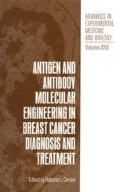Abstract
Major advances have occured in the structural analysis of mucins found in breast cancer following the isolation of cDNAs and the gene for MUC1 - which is the predominant mucin expressed in breast cancer1-4. In addition, other genes coding for mucins have been identified which are expressed in a variety of tissues, and are also found in breast tissue and to a lesser extent in breast cancer (particularly MUC2 and MUC3)5, 6 It was of interest that these genes were isolated using polyclonal antibodies and bacterial expression libraries, indicating that the active antibodies were detecting a non-glycosylated linear peptide, and this prediction was proven by the finding that many existing anti-MUC1 monoclonal antibodies react with synthetic peptides. The focus of this review will be to determine whether: a) monoclonal antibodies made against tumors react with peptides and what epitopes are detected (particularly for MUC1); b) if anti-pep tide antibodies can be made which react with cancers (MUC1,2, 3); c) second generation antibodies can be made to fusion proteins (MUC1); d) and what epitopes are detected with all of these antibodies; e) finally, what are the implications of these new advances in the diagnosis and treatment of breast cancer.
Access this chapter
Tax calculation will be finalised at checkout
Purchases are for personal use only
Preview
Unable to display preview. Download preview PDF.
References
S.J. Genlder, J. M. Burchell, T. Duhig, D. Lamport, R. White, M. Parker, and J. Taylor, Papadimitriou, Cloning of partial cDNA coding differentiation and tumour-associated mucin glycoproteins expressed by human mammary epithelium, Proc. Natl. Acad. Sci. USA, 84: 6060–6064 (1987).
J. Siddiqui, M. Abe, D. Hayes, E. Shani, E. Yunis, and D. Kufe, Isolation and sequencing of a cDNA coding for the human DF3 breast carcinoma associated antigen, Proc. Natl. Acad. Sci. USA, 85: 2320–2323 (1988).
D. H. Wreschner, M. Hareuveni, I. Tsarfaty, N. Smorodinsky, J. Horev, J. Zaretsky, P. Kotkes, M. Weiss, R. Lathe, A. Dion, and I. Keydar, Human epithelial tumor antigen cDNA sequences-differential splicing may generate multiple protein forms, Eur. J. Biochem. 189: 463–474 (1990).
M. J. L. Lightenberg, H. L. Vos, A. C. M. Gennissen, and J. Hilkens, Episialin, a carcinoma-associated mucin, is generated by a polymorphic gene encoding splice variants with alternative amino-termini, J. Biol. Chem. 265: 5573–5578 (1990).
P.X. Xing, J. Prenzoska, G.T. Layton, P. Devine, and I.F.C. McKenzie, Second-generation monoclonal antibodies to intestinal MUC2 peptides reactive with colon cancer, J. Natl. Cancer Inst. 84: 699–703 (1992).
V. Apostolopoulos, P.-X. Xing, and I.F.C. McKenzie, Second genration MUC3 peptide monoclonal antibodies reactive with colon cancer, Gastroenterology. (1992), (Submitted).
P.X. Xing, J. Prenzoska, K. Quelch, and I.F.C. McKenzie, Second generation anti-MUC1 peptide monoclonal antibodies, Cancer Res. 52: 2310–2317 (1991).
R. S. Hodges, and R. B. Merrifield, Monitoring of solid phase peptide synthesis by an automated spectrophomeric picrate method, Anal. Biochem. 65: 241–252 (1975).
H. M. Geyson, S. J. Rodda, T. J. Mason, G. Tribbick, and P. G. Schoofs, Strategies for epitope analysis using peptide synthesis, J. Immunol. Meth. 102: 259–274 (1987).
P. X. Xing, J. Prenzoska, and I.F.C. McKenzie, Epitope mapping of anti-breast and anti-ovarian mucin monoclonal antibodies, Molecular Immunol. 29: 641–650 (1991).
P. X. Xing, K. Reynolds, G. Pietersz, and I.F.C. McKenzie, Effect of variations in peptide sequence on anti-human milk fat globule membrane antibody reactions, Immunology. 72: 304–311 (1991).
V. Apostolopoulos, P. X. Xing, J.A. Trapani, and I.F.C. McKenzie, Production of anti-breast cancer monoclonal antibodies using a glutathione-S-transferanse-MUC1 bacterial fusion protein, Br J Cancer. 67: 713–729 (1993).
J. Burcell, S. Gendler, J. Taylor-Papadimitriou, A. Girling, A. Lewis, R. Millis and D. Lamport, Development and characterization of breast cancer reactive monoclonal antibodies directed to the core protein of the human milk mucin, Cancer Res. 47: 5476–7482 (1987).
D. N. Posnett, H. McGrath, and J. P. Tarn, A novel method for producing anti-peptide antibodies: Production of site-specific antibodies to the T cell antigen receptor ß-chain, J. Biol. Chem. 263: 1719–1725 (1988).
J. R. Gum, J. C. Byrd, J. W. Hicks, N. W. Toribara, D. T. A. Lamport, and Y. S. Kim, Molecular cloning of human intestinal mucin cDNAs: Sequence analysis and evidence for genetic polymorphism, J. Biol. Chem. 264: 6480–6487 (1989).
B. H. Jany, M. W. Gallup, P.-S. Yan, J. R. Gum, Y. S. Kim, Human brounchus and intestine express the same mucinm gene, J. Clin. Invest. 87: 77–82 (1991).
J. Hilkens, M. J. L. Ligtenberg, H. Vos, and S. Litvinov, Cell membrane-associated mucins and their adhesion-modulating property. TIBS. 17: 359–363 (1992).
T. P. Hopp, and K.R. Woods, A computer program for predicting protein antigenic determinants, Mol. Immunol. 20: 483–493 (1983).
J. R. Gum, J. W. Hicks, D. M. Swallow, R. L., Lagace, J. E. Byrd, D. T. A. Lamport, B. Siddick, and Y. S. Kim, Molecular cloning of cDNAs derived from a novel human intestinal mucin gene, Biochem. Biophy. Res. Comm. 171: 407–415 (1990).
M. Hareuveni, C. Gautier, M.-P. Kieny, D. Wreschner, P. Chambon, and R. Lathe, Vaccination against tumor cells expressing breast cancer epithelial tumor antigen, Proc. Natl. Acad. Sci. USA. 87: 9948–10502 (1990).
Author information
Authors and Affiliations
Editor information
Editors and Affiliations
Rights and permissions
Copyright information
© 1994 Springer Science+Business Media New York
About this chapter
Cite this chapter
Xing, PX., Apostolopoulos, V., Trapani, J., Prenzoska, J., McKenzie, I.F.C. (1994). Peptide Epitopes in Breast Cancer Mucins. In: Ceriani, R.L. (eds) Antigen and Antibody Molecular Engineering in Breast Cancer Diagnosis and Treatment. Advances in Experimental Medicine and Biology, vol 353. Springer, Boston, MA. https://doi.org/10.1007/978-1-4615-2443-4_2
Download citation
DOI: https://doi.org/10.1007/978-1-4615-2443-4_2
Publisher Name: Springer, Boston, MA
Print ISBN: 978-1-4613-6038-4
Online ISBN: 978-1-4615-2443-4
eBook Packages: Springer Book Archive

